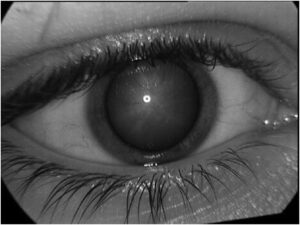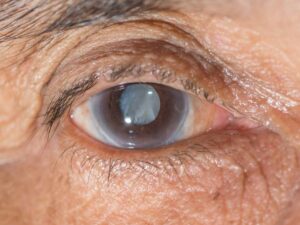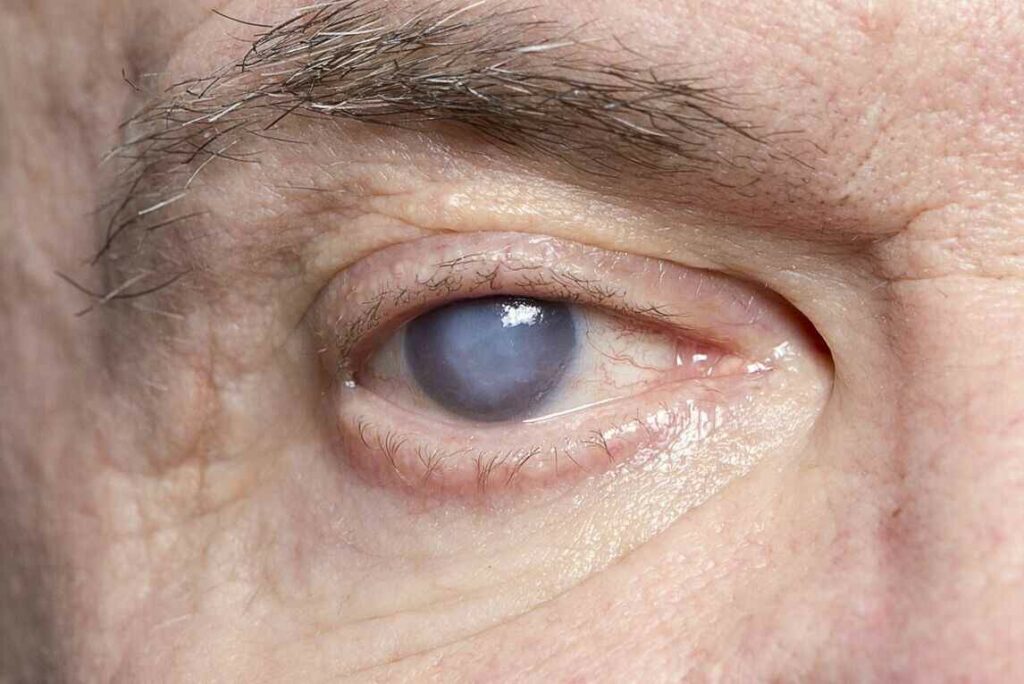If you are like most people, you have never heard of sorbitol cataracts. This is because it is a relatively rare condition. However, if you are unfortunate enough to develop this condition, it is important that you understand what it is and how to treat it. In this blog post, we will discuss the causes, symptoms, and treatment options for sorbitol cataracts.
Contents
What Is A Sorbitol Cataract?
 Sorbitol cataracts are surgically removed cataracts that develop in the crystalline lens of the eye. The name comes from the sugar alcohol sorbitol, which can accumulate in the lens and cause a cloudy white discoloration on its surface. This type of cataract typically affects both eyes.
Sorbitol cataracts are surgically removed cataracts that develop in the crystalline lens of the eye. The name comes from the sugar alcohol sorbitol, which can accumulate in the lens and cause a cloudy white discoloration on its surface. This type of cataract typically affects both eyes.
It is a type of sugar cataract, which is caused by an accumulation of sugar molecules in the lens. These cataracts can cause a decrease in vision, and may also lead to pain or discomfort. This is associated with diabetes mellitus and other metabolic disorders where high sugar levels can accumulate in the eye.
What Are Some Signs And Symptoms?
There are several signs and symptoms associated with a sorbitol cataract, including:
- Blurred vision: It is normal to experience decreased clarity in your vision as the cataract progresses.
- Double vision: As the lens becomes cloudier, you may begin to experience double vision when looking at faraway objects.
- Glare sensitivity: Bright lights and sunlight can become difficult to look at due to glare sensitivity caused by the cataract.
- Halos around lights: You may experience halos, or circles of light around bright objects like headlights when driving at night.
- Colored vision changes: Colors can become duller and less vibrant as the cataract progresses.
In some cases, the lens may become cloudy or discolored, which can affect vision further. If left untreated, a sorbitol cataract can cause serious eye damage. Therefore, if you notice any of the above symptoms, it is important to consult with an ophthalmologist as soon as possible.
What Causes Sorbitol Cataracts?
The primary cause of a sorbitol cataract is an excess build-up of sugars in the lens of the eye. This can be caused by diabetes or other metabolic disorders that cause the body to produce more sugar than it can use. The accumulation of this sugar in the lens causes it to become cloudy and obstructs vision.
In addition, there are some other possible causes and risk factors to increase the chances of a sorbitol cataract forming, such as:
- Age. As we age, the lenses of our eyes become more susceptible to damage and develop changes that can lead to sorbitol buildup.
- Genetics. A family history of diabetes or metabolic disorders increases your risk of developing a sorbitol cataract.
- Medication Usage. Some medications can cause a buildup of sugar in the lens, increasing your risk of developing a sorbitol cataract.
- Environmental Exposure. Prolonged exposure to UV light or other environmental toxins increases the chances of developing a sorbitol cataract.
These are some of the potential causes and risk factors for sorbitol cataracts. It’s important to understand that any person can develop a cataract, regardless of age or gender, so it’s important to be aware of your risk factors and take proactive steps to protect your vision.
Just be sure to talk to your doctor if you have any concerns about cataracts and your risk of developing them. As the right treatment and lifestyle modifications can help reduce the risk of cataracts, it’s important to get an early diagnosis.
How Is Sorbitol Cataract Diagnosed?
 The best way to diagnose a sorbitol cataract is through a comprehensive eye exam. During this exam, your doctor will evaluate your vision and examine the lens of your eye. They will look for any changes in the shape or size of the lens, and they may also take photographs to document their findings.
The best way to diagnose a sorbitol cataract is through a comprehensive eye exam. During this exam, your doctor will evaluate your vision and examine the lens of your eye. They will look for any changes in the shape or size of the lens, and they may also take photographs to document their findings.
If a sorbitol cataract is suspected, your doctor may order a special imaging test called an optical coherence tomography (OCT) scan to measure the amount of sugar in the lens. They may also order other tests to rule out any underlying conditions that could be causing the cataract.
How Can You Treat It?
When it comes to treating a sorbitol cataract, there are various things your doctor may suggest. Depending on the severity of your condition, you may need surgery to remove the cataract and replace it with an artificial lens. Surgery is known as cataract extraction and its success rate is high when done by a qualified ophthalmologist or surgeon.
During the procedure, the eye doctor will use an ultrasound to break up and remove the cloudy cataract. The artificial lens is then inserted, allowing light to pass through more clearly.
In some cases, a sorbitol cataract may not require surgery. Your ophthalmologist may recommend other treatment options. These might include:
- Medication: Certain medications, such as steroids and anti-inflammatories, may help reduce the effects of a sorbitol cataract.
- Laser treatments: Laser treatments can be used to break up the cataract, reducing its effect on your vision.
- Vision correction: If necessary, glasses or contact lenses may be used to improve your vision.
- Dietary changes: Increasing the number of fruits, vegetables, and other healthy foods in your diet can help reduce the effects of a sorbitol cataract.
No matter what treatment option you choose, it is important to discuss all available options with your doctor and make sure that you understand the risks and expected outcomes. Sorbitol cataracts can have a significant impact on your quality of life, so it is essential to take the time to make an informed decision about how to proceed.
What Are The Long-Term Effects?
The long-term effects of sorbitol cataracts vary depending on their severity. In the early stages, individuals may experience blurred vision or difficulty seeing objects in the distance. As the condition progresses, it can cause decreased vision and even blindness if left untreated.
In some cases, surgery may be necessary to remove the cataract from the eye. Additionally, long-term exposure to high levels of sorbitol can also lead to other eye-related issues, such as macular degeneration and glaucoma.
Moreover, untreated sorbitol cataracts can also lead to inflammation and infection in the eye, which can result in permanent vision damage. It is important for individuals with this condition to have regular checkups with their doctor or ophthalmologist to monitor any changes in vision quality!
How Can Sorbitol Cataract Be Prevented?
 Well, prevention is better than cure. To avoid the risk of developing sorbitol cataracts, it is important to maintain good eye health. This includes:
Well, prevention is better than cure. To avoid the risk of developing sorbitol cataracts, it is important to maintain good eye health. This includes:
- Eating healthy foods that contain the essential nutrients needed for proper vision.
- Wearing sunglasses and a wide-brimmed hat when outdoors to help protect eyes from ultraviolet light exposure.
- Avoiding smoking and drinking alcohol.
- Getting regular eye check-ups to ensure the health of your eyes.
- Limiting exposure to blue light, especially from digital screens.
- Taking steps to reduce any inflammation or allergies that may be affecting your eyesight.
- Using protective eyewear when participating in certain activities such as sports.
- Wearing contact lenses only when instructed and using proper cleaning methods to avoid infection.
In addition, it is important to keep blood sugar levels under control. As high levels of glucose in the blood can cause damage to the lens of the eye and make a person more likely to develop sorbitol cataracts. Therefore, people with diabetes should follow their doctor’s orders for managing their condition and keep regular eye check-ups to reduce the risk of developing this type of cataract.
Conclusion
In conclusion, sorbitol cataracts can be a major issue for those who don’t take the proper precautions to prevent them. It is important to know that there are risk factors associated with a high-sugar diet and that some medications can be a potential cause as well.
Overall, if you are having any changes or pain in your eyes, it is important to visit an eye doctor for a comprehensive eye exam. With proper management and prevention strategies, sorbitol cataracts can be managed effectively!
For more information and guidance, be sure to contact Mantra Care. At MantraCare we have a team of experienced eye surgeons, who will be happy to answer any questions on cataract surgery. Call us at +91-9711116605 for any inquiries.
